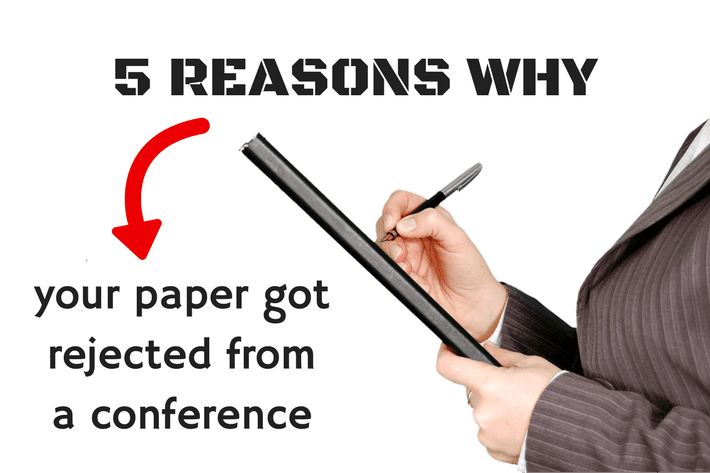The following article is archived and is no longer considered up-to-date. Please interpret its content in the context of the publishing date.

ARCHIVED
5 reasons why your paper got rejected from a conference
Read a summary or generate practice questions using the INOMICS AI tool
When you want to present your work at a conference, either as a poster or as a presentation, then you need to first submit an abstract. A committee from the conference will go through all the abstracts and choose some of them to be presented at the conference. So there are times when you will be not be invited to present your work at the conference. But why is this? What leads to your paper being rejected from a conference? Here are five reasons that this might happen.
1. Your project wasn't relevant to the conference theme
Generally, a conference will have a theme which is relevant to the main subject of the field. For example, an international development conference might focus on a particular country, region, or research methodology. For the best chances of having your paper accepted to the conference, you need to find a way to link your work to the theme of the conference. Think about how your work could be relevant to the theme – even if it isn't directly related, you might be able to find a way that your results could have an impact on the theme more broadly.
2. Your abstract had too much theory and not enough results
While it's true that conferences do often accept theoretical work as well as empirical work, it can be much harder to get a theoretical paper accepted than an empirical one. If your paper has been rejected, it might have been because it focused too much on theoretical aspects. If you have empirical results, even if they are incomplete or preliminary, then you should include this information in your abstract for better chances of being accepted. Alternatively, if you wish to submit a purely theoretical paper, make sure that you choose the conference to which you are submitting carefully. Some conferences are more welcoming of theoretical work than others.
3. Your project is not yet far enough along to present
Conferences offer you the chance to present your work and to get feedback on it, even if your project is still underway and you have not yet completed it. For example, perhaps you are planning to perform your experiment with 40 participants, but so far you have only done it with 20 participants. In this case, you might do a quick preliminary data analysis to see whether your results look promising, and then present them at a conference if they do. However, you cannot always present very early work. If you don't yet have results, or if you have only run a very small number of participants, then your work is unlikely to be accepted for a conference.
4. Your project is not original enough
A big draw of the work presented at conferences is that it is new and cutting edge. There is some work which is less likely to be accepted, such as a replication of a previous study. Although this can be important and useful work, it is not novel enough to be presented at a conference. Try to find the unique angle that your work offers – whether that is in terms of theoretical ideas, experimental methodology, or potential consequences of your study. You need to be able to show how your work is different from what has been done previously, to demonstrate that it would be useful for a conference audience to hear about it.
5. Your abstract didn't convey why your project is interesting
Finally, even with the best project in the world, you won't be accepted to present at a conference if you abstract isn't good. Make sure that you follow any guidelines given by the conference organisers – for example, conferences often have a strict maximum word count for abstracts, and they may have a required structure too. Also, give a brief overview of your results in your abstract and ensure that you talk about why your research is novel or important. Make it easy for anyone to read your abstract and immediately know what your work is about and why it is of interest.
-
- PhD Candidate Job
- Posted 1 week ago
Vacancy for assistants in Economics
At University of Ghent in Gent, Belgium
-
- Conference
- Posted 2 weeks ago
MIRDEC 24th ISTANBUL 2025 Conference
Between 24 Apr and 25 Apr in Istanbul, Türkiye
-
- Conference
- Posted 1 week ago
International Trade and Finance Association Annual Conference 2025
Between 27 May and 29 May in United States












